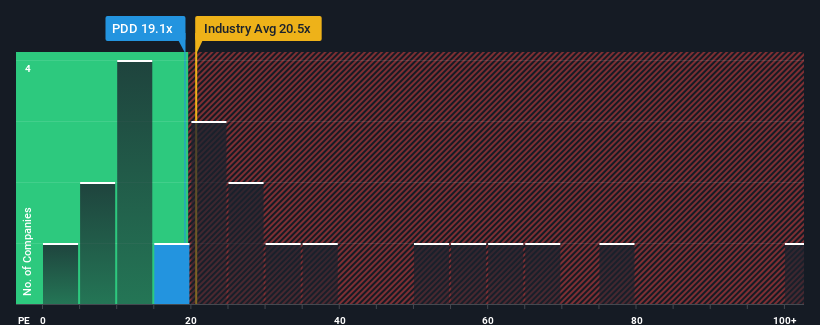- United States
- /
- General Merchandise and Department Stores
- /
- NasdaqGS:PDD
Take Care Before Diving Into The Deep End On PDD Holdings Inc. (NASDAQ:PDD)

With a median price-to-earnings (or "P/E") ratio of close to 17x in the United States, you could be forgiven for feeling indifferent about PDD Holdings Inc.'s (NASDAQ:PDD) P/E ratio of 19.1x. However, investors might be overlooking a clear opportunity or potential setback if there is no rational basis for the P/E.
With its earnings growth in positive territory compared to the declining earnings of most other companies, PDD Holdings has been doing quite well of late. It might be that many expect the strong earnings performance to deteriorate like the rest, which has kept the P/E from rising. If you like the company, you'd be hoping this isn't the case so that you could potentially pick up some stock while it's not quite in favour.
Check out our latest analysis for PDD Holdings

Does Growth Match The P/E?
In order to justify its P/E ratio, PDD Holdings would need to produce growth that's similar to the market.
If we review the last year of earnings growth, the company posted a terrific increase of 78%. Still, EPS has barely risen at all from three years ago in total, which is not ideal. Accordingly, shareholders probably wouldn't have been overly satisfied with the unstable medium-term growth rates.
Looking ahead now, EPS is anticipated to climb by 29% per annum during the coming three years according to the analysts following the company. With the market only predicted to deliver 10% per annum, the company is positioned for a stronger earnings result.
With this information, we find it interesting that PDD Holdings is trading at a fairly similar P/E to the market. It may be that most investors aren't convinced the company can achieve future growth expectations.
The Final Word
We'd say the price-to-earnings ratio's power isn't primarily as a valuation instrument but rather to gauge current investor sentiment and future expectations.
We've established that PDD Holdings currently trades on a lower than expected P/E since its forecast growth is higher than the wider market. When we see a strong earnings outlook with faster-than-market growth, we assume potential risks are what might be placing pressure on the P/E ratio. At least the risk of a price drop looks to be subdued, but investors seem to think future earnings could see some volatility.
It's always necessary to consider the ever-present spectre of investment risk. We've identified 1 warning sign with PDD Holdings, and understanding should be part of your investment process.
You might be able to find a better investment than PDD Holdings. If you want a selection of possible candidates, check out this free list of interesting companies that trade on a low P/E (but have proven they can grow earnings).
New: Manage All Your Stock Portfolios in One Place
We've created the ultimate portfolio companion for stock investors, and it's free.
• Connect an unlimited number of Portfolios and see your total in one currency
• Be alerted to new Warning Signs or Risks via email or mobile
• Track the Fair Value of your stocks
Have feedback on this article? Concerned about the content? Get in touch with us directly. Alternatively, email editorial-team (at) simplywallst.com.
This article by Simply Wall St is general in nature. We provide commentary based on historical data and analyst forecasts only using an unbiased methodology and our articles are not intended to be financial advice. It does not constitute a recommendation to buy or sell any stock, and does not take account of your objectives, or your financial situation. We aim to bring you long-term focused analysis driven by fundamental data. Note that our analysis may not factor in the latest price-sensitive company announcements or qualitative material. Simply Wall St has no position in any stocks mentioned.
About NasdaqGS:PDD
PDD Holdings
A multinational commerce group that owns and operates a portfolio of businesses.
Flawless balance sheet and undervalued.
Similar Companies
Market Insights
Community Narratives





